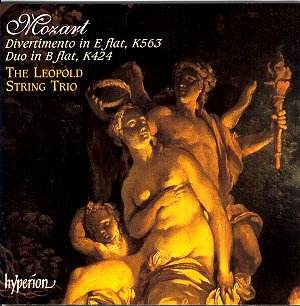Though Iíve read reams on the tragedy of Mozartís early
death, I donít remember ever having heard or read the wish that he had
written more than he did. I think this reflects, not the fact that we
love him a little less than we say we do, but that we simply cannot cope
with all his output as it is.
Take all those Divertimenti and Serenades. The aristocratic
patrons of Mozart, Haydn and their lesser contemporaries expected to
be able to boast to their guests that new music was on offer that evening
and their musician-servants were expected to provide it. Not long ago
I was writing about Spontiniís first opera and commenting that Italians
went to the opera at the beginning of the 19th Century in
the same spirit as a later age went to the cinema. Writing these divertimenti
and the like was the 18th Century equivalent to composing
jingles for TV commercials and Mozart, with his sublime facility, could
churn them off better than any.
Except, of course, that Mozart never churned anything
off. Supposing the Divertimento here was one of a mere dozen of his
works to have survived. How we would wonder at it, analyse it. Every
note of it would be famous, its adagio would be celebrated as one of
the most divinely expressive pieces ever penned.
And, maybe, it would get performed with that burning
conviction that tends to be reserved for the pinnacles of the repertoire.
The Leopold String Trio are very, very good, no mistake about it, with
the sweet goodness of good musician friends who gather late at night
to enjoy making music for their own benefit, with no gallery to play
to, no public to make their points to. Or like a group of well-behaved,
civilised musicians playing in the corner of an aristocratic dining-room
while their social betters wine and dine. (Though even the hostess herself
might be imagined to pause as the trio to the second minuet enters,
her fork halfway between her plate and her mouth, to remark that the
music was very nice this evening; and perhaps again at the folk-like
simplicity of the finaleís main theme). Itís all a question of oneís
point of view, but mightnít they have been a little more outgoing, a
little more intent on engaging their public rather than just playing
to them? Still, they certainly respond to the great adagio.
The duo is one of two, thrown off (except, again, that
it was no such thing) to help out Haydnís younger brother Michael who
was too ill to get a commissioned set of six completed. Itís remarkable
what sonority Mozart can get out of just two instruments. If you want
to hear the disc straight through, I suggest programming this first.
Beautiful recording and detailed notes from Duncan
Druce in English, French and German.
Christopher Howell

![]() HYPERION CDA67246 [67.27]
HYPERION CDA67246 [67.27]